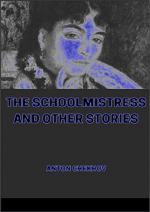“The chief judge meant to say ‘to the death penalty,’ but he dropped from his hands the paper on which the sentence was written, wiped the cold sweat from his face, and cried out:
“’No! May God punish me if I judge wrongly, but I swear he is not guilty. I cannot admit the thought that there exists a man who would dare to murder our friend the doctor! A man could not sink so low!’
“‘There cannot be such a man!’ the other judges assented.
“‘No,’ the crowd cried. ‘Let him go!’
“The murderer was set free to go where he chose, and not one soul blamed the court for an unjust verdict. And my grandmother used to say that for such faith in humanity God forgave the sins of all the inhabitants of that town. He rejoices when people believe that man is His image and semblance, and grieves if, forgetful of human dignity, they judge worse of men than of dogs. The sentence of acquittal may bring harm to the inhabitants of the town, but on the other hand, think of the beneficial influence upon them of that faith in man—a faith which does not remain dead, you know; it raises up generous feelings in us, and always impels us to love and respect every man. Every man! And that is important.”
Mihail Karlovitch had finished. My neighbor would have urged some objection, but the head-gardener made a gesture that signified that he did not like objections; then he walked away to the carts, and, with an expression of dignity, went on looking after the packing.
THE BEAUTIES
I
I REMEMBER, when I was a high school boy in the fifth or sixth class, I was driving with my grandfather from the village of Bolshoe Kryepkoe in the Don region to Rostov-on-the-Don. It was a sultry, languidly dreary day of August. Our eyes were glued together, and our mouths were parched from the heat and the dry burning wind which drove clouds of dust to meet us; one did not want to look or speak or think, and when our drowsy driver, a Little Russian called Karpo, swung his whip at the horses and lashed me on my cap, I did not protest or utter a sound, but only, rousing myself from half-slumber, gazed mildly and dejectedly into the distance to see whether there was a village visible through the dust. We stopped to feed the horses in a big Armenian village at a rich Armenian’s whom my grandfather knew. Never in my life have I seen a greater caricature than that Armenian. Imagine a little shaven head with thick overhanging eyebrows, a beak of a nose, long gray mustaches, and a wide mouth with a long cherry-wood chibouk sticking out of it. This little head was clumsily attached to a lean hunch-back carcass attired in a fantastic garb, a short red jacket, and full bright blue trousers. This figure walked straddling its legs and shuffling with its slippers, spoke without taking the chibouk out of its mouth, and behaved with truly Armenian dignity, not smiling, but staring with wide-open eyes and trying to take as little notice as possible of its guests.




